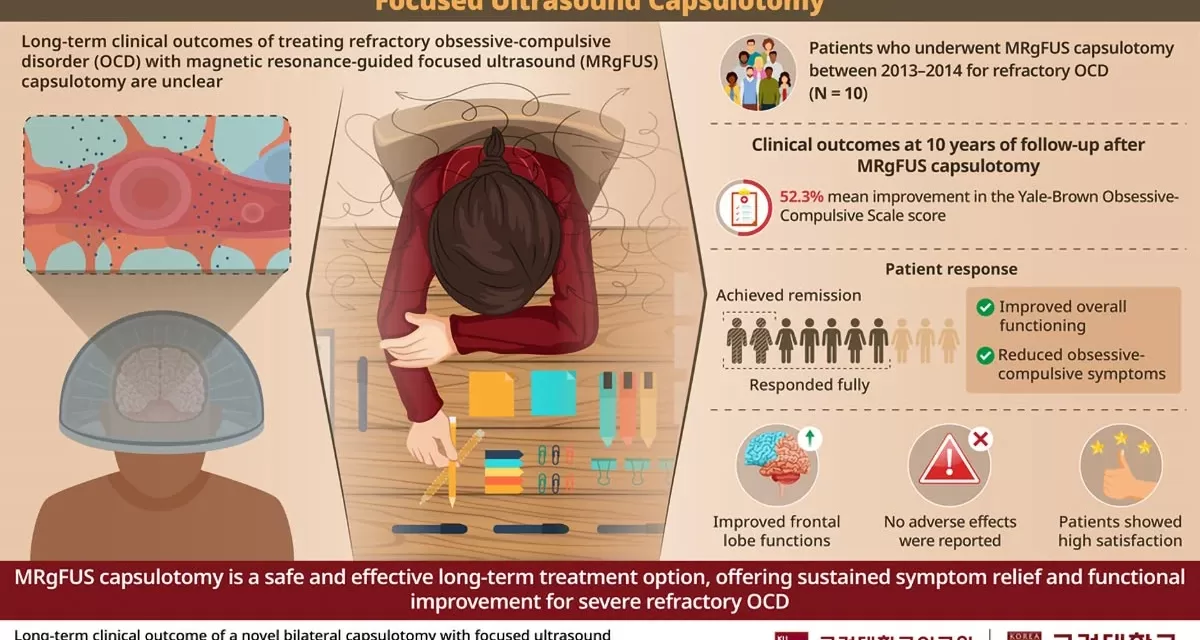December 8, 2024 – In a breakthrough for mental health treatment, a new non-invasive brain surgery technique has shown long-term effectiveness in treating severe obsessive-compulsive disorder (OCD), offering new hope to patients struggling with this debilitating condition.
Recent advancements in brain surgery have significantly reduced the stigma surrounding psychiatric treatments, particularly those involving direct interventions in the brain. While brain surgery once carried negative connotations, largely due to the dark history of lobotomies, modern developments like deep brain stimulation have begun to shift public perception. Now, a new procedure involving magnetic resonance-guided focused ultrasound (MRgFUS) promises to be a game-changer for individuals suffering from refractory OCD, a form of the disorder that does not respond to traditional treatments.
OCD: A Chronic and Overwhelming Condition
OCD is characterized by uncontrollable and often debilitating repetitive thoughts and behaviors. For those with treatment-resistant OCD, conventional methods such as therapy and medication often fail to provide relief, leading to a significant impact on daily functioning and quality of life. The need for effective treatment options has never been more critical.
The Groundbreaking MRgFUS Capsulotomy Procedure
In a recent clinical trial led by researchers from South Korea, the focus shifted to a new approach: MRgFUS capsulotomy. This procedure, a non-invasive form of brain surgery, uses focused ultrasound waves to precisely target and ablate the brain tissues responsible for the obsessive thoughts and behaviors seen in OCD.
In the initial stages of testing, MRgFUS capsulotomy demonstrated promising results, with patients showing improved symptoms and increased daily functioning. However, the long-term effectiveness of the treatment remained unclear.
Sustained Success: A 10-Year Follow-Up Study
To address this, the research team conducted a groundbreaking 10-year follow-up study, which confirmed that MRgFUS capsulotomy offers sustained, positive outcomes for patients with refractory OCD. The results, recently published in Molecular Psychiatry, revealed that patients who underwent the procedure showed continued improvements in OCD symptoms, as well as high levels of satisfaction even a decade after treatment. The study has solidified MRgFUS capsulotomy as a safe and effective long-term solution for patients who previously had few alternatives.
Dr. Jin Woo Chang, the lead researcher at Korea University Anam Hospital, praised the findings as a significant milestone in the treatment of OCD, noting that the study marked the world’s first long-term clinical trial for MRgFUS in OCD patients.
Expanding the Scope: Beyond OCD Treatment
The potential of MRgFUS extends beyond OCD. Dr. Chang believes that the procedure may also be effective for treating other psychiatric disorders, including refractory depression, due to its non-invasive nature and promising safety profile. “These studies not only highlight the efficacy of MRgFUS in OCD but also suggest its broader applicability in managing other mental health conditions,” said Dr. Chang.
The results of this research have opened the door to new possibilities for patients struggling with serious psychiatric issues, providing a ray of hope for those previously without options.
A New Era of Psychiatric Treatment
With continued advances in surgical techniques like MRgFUS, the future of psychiatric care looks brighter. Dr. Chang concludes, “This new technology could offer a new lease on life for those suffering from severe psychiatric disorders. It represents a transformative step forward in treating complex mental health conditions without the complications of traditional surgery.”
As MRgFUS technology progresses, it may redefine how we approach the treatment of mental health disorders, marking a turning point in the fight against chronic, treatment-resistant psychiatric conditions.
Reference:
“Long-term clinical outcome of a novel bilateral capsulotomy with focused ultrasound in refractory obsessive-compulsive disorder treatment” by Kyung Won Chang, Jhin Goo Chang, Hyun Ho Jung, Chan-Hyung Kim, Jin Woo Chang, and Se Joo Kim, Molecular Psychiatry, 28 October 2024.
DOI: 10.1038/s41380-024-02799-9.












